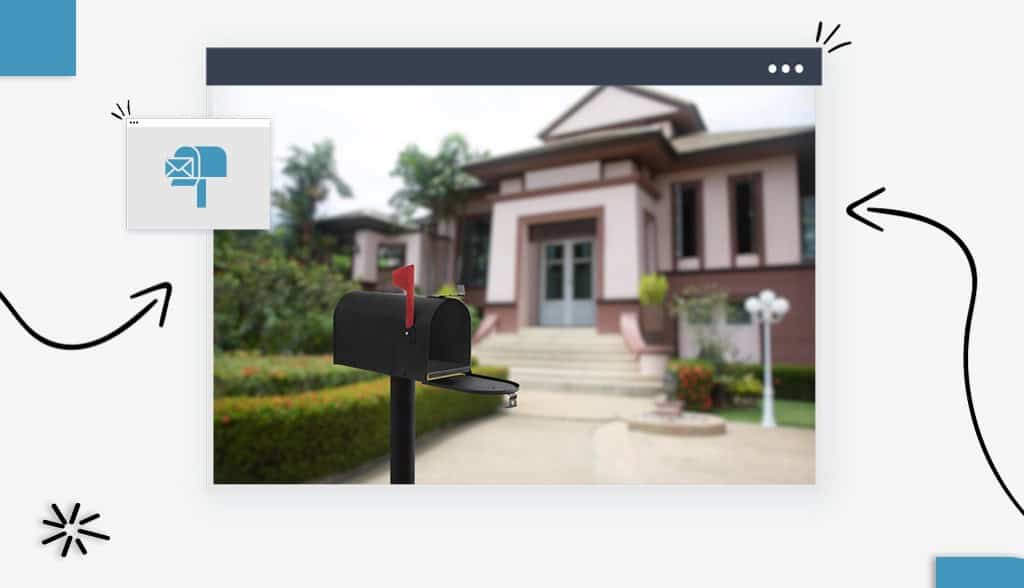
Even though we live in an ever-increasing digital world, most entrepreneurs starting small businesses (and many individuals) need a physical address to receive mail or packages.
And if you’re a remote business owner, a full-time traveler, a digital nomad, or a home-based business owner who wants to separate your personal and private business addresses, that can be a problem!
Here’s where a virtual mailbox for small businesses provides a convenient and affordable solution.
But you might have some doubts about using one!
If so, allow us to remove them by explaining what a digital mailbox for small businesses is and how it can help you.

A virtual mailbox (also known as a virtual address, digital mailbox, virtual business address, or cloud-based mailbox) is a service that provides a permanent street address that allows you to receive, track, access, and organize your physical mail anywhere using an internet connection.
Most virtual mailbox providers offer a variety of address locations, which suit businesses requiring a physical mailing address in multiple locations.
Once you select a virtual mailbox provider and choose your address location, you receive mail like any other address. Your provider scans the package’s exterior or envelope and uploads it onto their app; you receive an instant email notification and then choose what to do next.
Depending on your virtual mailbox provider and their additional services, you can ask them to open your mail or package, forward it to another address, shred or recycle it, package, store, or ship it, and deposit it if it’s a check.
Most U.S. businesses need a business address, but many U.S. states won’t allow a PO Box.
Using your home address isn’t a good idea for many reasons (such as privacy and security), so a virtual mailbox solves the problem.
Besides the legal requirements and security advantages, a street address adds credibility and professionalism to your business, avoids office space costs, and moves with you should you change location.
But a digital mailbox offers other benefits, too:
A virtual mailbox allows business owners to have a professional mail address separate from their home address, which suits the digital world where many of us now work.
However, not only digital nomads of businesses operating in another state can benefit from an all-in-one mailing solution.
More US states accept a virtual mailbox permanent street address than a PO Box, as do couriers like FedEx, USPS, and UPS.
A permanent virtual mailbox street address is also valid for receiving tax correspondences, driver’s licenses, and credit cards.
And, of course, the added benefit is you can move without changing your address.
Most virtual mailbox providers will deposit your incoming checks within one business day; your bank then processes the check and deposits the cash into your business or private account.
A digital mailbox stores and records your important and legal documents, such as licenses, permits, bills, invoices, and taxes, ensuring you always find essential mail.
A cloud-based mailbox opens and scans your mail, allowing you to choose what happens next, such as shredding, storing, or forwarding. As you can conveniently search your mail, it saves you the time of manually sorting your documents, allowing you to focus on running your business.
Centralizing your mail in one location avoids multiple delivery addresses, enabling you to manage your business and personal mail on one platform.
Research shows that most people trust a business with a physical address more than one using a PO Box, and trust is crucial when building your brand and converting prospects into paying customers.
Most virtual mailbox service providers implement high-security measures to protect their client’s business information.
Using a secure digital mailbox service also helps reduce the risk of lost or stolen packages.
When your home address is your business address, people can see it online, and that’s not advisable for privacy and security reasons because anyone could target your location for theft, putting you or your family at risk.
Here’s a run-down of the benefits of a virtual mailbox:
All substantial reasons to use a virtual mailbox for your small business, right?
But it’s not only businesses that can benefit from using one, I`ll explain next:
Anyone can use a virtual mailbox for their business, but you don’t need to be an entrepreneur to use one!
A digital mailbox can also help:
Okay, a virtual mailbox can help you run your business effectively, but how do they work?
Let’s see:
Learning how it works is simple once you choose your virtual mailbox provider.
Here’s how a virtual address works:

Virtual mailbox prices vary depending on providers, your chosen plan, the additional services you opt to use, and the volume of mail you’ll receive.
On average, most business plans cost between $50 and $150 per month, while individual plans range from $20 to $50.
Some digital mailbox providers offer a free trial and a discount for paying an annual fee upfront.
Begin by choosing a virtual address provider that suits your small business needs.
For example, account for your budget (include that in your business plan) and the quantity and type of mail you expect to receive, such as payments, personal mail, or packages.
Besides your needs, getting and setting up a virtual mailbox only requires ticking the relevant boxes and usually takes a few minutes.
However, you must fill out and submit U.S. Postal Form 1583 to authorize your virtual mailbox provider to receive your mail at your chosen address.
Virtual mailbox providers allow you to receive, view, and manage your mail, packages, and deposit checks from any location on any device with an internet connection. This suits entrepreneurs and individuals who work remotely, travel, run a business from another location, or care for others.
Additionally, a digital address provides the security, privacy, and credibility every business needs to succeed.
This portion of our website is for informational purposes only. Tailor Brands is not a law firm, and none of the information on this website constitutes or is intended to convey legal advice. All statements, opinions, recommendations, and conclusions are solely the expression of the author and provided on an as-is basis. Accordingly, Tailor Brands is not responsible for the information and/or its accuracy or completeness. It also does not indicate any affiliation between Tailor Brands and any other brands, services or logos.
Products
Resources
@2024 Copyright Tailor Brands